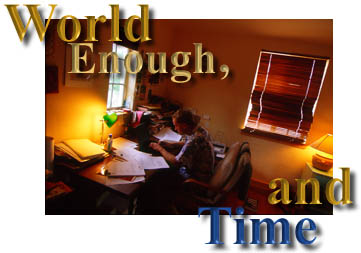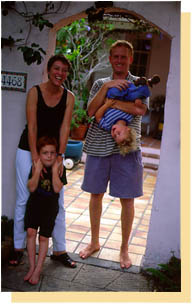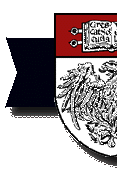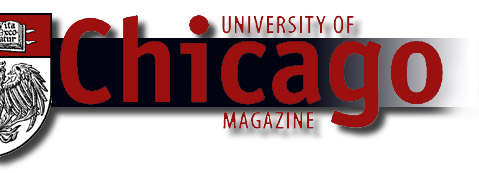 |

Poet Campbell
McGrath has plenty of material and a voice all his own.
To reach the front door of Campbell McGrath’s Miami home, visitors
must pass under a stucco archway draped with yellow-flowering Alamanda
vines. The open-air doorway leads into a walled garden dotted with
colorful toys, and subtropical plants and palms seem to signal by
profusion their contentment with a climate that’s mild even in December.
The yard’s array of elements hints at the abundance of material
McGrath incorporates into his poetry, which itself reflects the
swell of activities in his full and thriving life. A poet whose
laurels are growing as quickly as the runaway Florida flora, McGrath
is also a father, teacher, and intellect, whose ongoing creative
“project” is nothing short of capturing the social, cultural, and
natural landscapes of America through poetry.
At 36, McGrath, AB’84, has been called the most prolific U.S. poet
of his generation. He has three books of poems in print, a fourth
on the way, and a short collection, or chapbook, due later this
year. McGrath spent much of last summer collaborating with a classics
scholar to put Aristophanes’ The Wasps in “a contemporary,
poetic voice” for publication this fall in the Penn Greek Drama
Series. Work is under way on a book of Florida poems, and he’s planning
a “sequel” to the central poem of his most recent book, Spring
Comes to Chicago. An associate professor of creative writing
at Florida International University, McGrath also heads its poetry
program.
 McGrath has received recognition from the start (one of his three
American Academy of Poets prizes came the year he graduated from
Chicago), but the award that has garnered the most attention came
last April, when he won the 1997 Kingsley Tufts Award for Spring
Comes to Chicago (Ecco Press, 1996). With its cash award of
$50,000, the Kingsley Tufts amounts to this country’s largest poetry
prize for a single work, recognizing “the most worthy collection
of poetry...by a poet who is past the beginning but has not reached
the pinnacle of his or her career.” McGrath was surprised to learn
that what he calls his “sprawling, giant book” had won the award,
for he hadn’t entered the competition. Rather, one of the judges,
Oregon poet Garrett Hongo, had circulated McGrath’s book, a satiric
meditation on capitalism, to the rest of the jury.
McGrath has received recognition from the start (one of his three
American Academy of Poets prizes came the year he graduated from
Chicago), but the award that has garnered the most attention came
last April, when he won the 1997 Kingsley Tufts Award for Spring
Comes to Chicago (Ecco Press, 1996). With its cash award of
$50,000, the Kingsley Tufts amounts to this country’s largest poetry
prize for a single work, recognizing “the most worthy collection
of poetry...by a poet who is past the beginning but has not reached
the pinnacle of his or her career.” McGrath was surprised to learn
that what he calls his “sprawling, giant book” had won the award,
for he hadn’t entered the competition. Rather, one of the judges,
Oregon poet Garrett Hongo, had circulated McGrath’s book, a satiric
meditation on capitalism, to the rest of the jury.
Eight months after receiving the Kingsley Tufts, McGrath—barefoot
on the shaded front porch of his pink stucco house—discusses the
award from a practical perspective. The prize money let him repay
a student loan, upgrade his computer system, and take last summer
off from teaching to write—time being the best gift of all for the
poet. The eddies of his conversation swirl for a moment around this
precious commodity. “If I could take the next three years off,”
he muses, “I could finish three new books. I have books coming,
books backed up in the creative pipeline.
|



